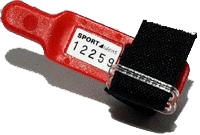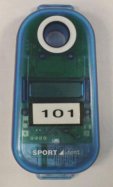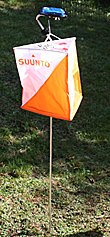Electronic Punching Information
SportIdent electronic punching system.
You may purchase an e-card from an orienteering supply vendor
( OUSA Vendors page )
or VOC will have a number of e-cards available to rent/purchase at
each meet. If you lose the rental card, you must reimburse VOC $35.00.
 (e-punch finger stick SI-5)
(e-punch finger stick SI-5)
If you have not seen a SportIdent electronic punch card (also called "E-card", "dipstick", "dibber", "finger stick" "e-stick" or "finger thingy"), it is a small device, about 2-1/2 inches long and about as thick as a pencil. It attaches to a finger with an elastic band, and is usually worn on the index finger. Attaching a short piece of bright orange or pink flagging tape to the card makes it more visible if you set it down or drop it. Please remove all duct tape, pins, etc before returning rental cards! Each E-cards has a unique serial number that is registered with its user in the event computer. During multi-day events, make sure that you use the same E-card.
Using the E-card:
Before you start, there are a few steps that need to be done.
First, you need to register the e-card on the event computer. At a large
meet with pre-registration, you may have already had to provide the registrar
with your e-stick serial number if you own an e-stick, or a specific e-stick may
have been assigned for you to use. At most local meets, you will either
rent an e-stick for the day or bring your own and be asked to insert it into a
master station that is connected to the event computer. It will read the
serial number for the registrar. The registrar will then complete any
other required information (name, course, class....).
Next, you must prepare your e-card by deleting old data
and then checking to make sure it is working properly. Before you start,
you will need to located the clear and check stations. These are usually
located near the start location.
Insert your card in the clear station and wait until it beeps and
flashes. This usually takes about 5 seconds. Now place your card in the
check
station. This verifies that your card is cleared and ready to use. It should
beep and flash immediately.

"Start" units. When the starter tells you to begin
your course, insert your card into the start unit. The start unit should beep
and flash immediately. This records your starting time on the card. You are
now on the clock and should begin orienteering immediately.

control unit mounted on top
At each control, insert your e-card into the "control unit" until it beeps and
flashes. This generally takes less than one second. Be sure to check codes,
and be sure to visit all of your controls in order. The software will catch you
if you go out of order or mis-punch. If you do punch at an incorrect control,
continue your course. The extra punch will not hurt you as long as you end up
with all of the correct controls in the proper order. If you accidentally skip
a control (say you find 5 before 4 and punch it), you must go back to 4, punch
it, then return to 5 and punch 5 again. Then visit all subsequent controls in sequence.
If the SI unit does not function (if there is no beep and flash), repeat trying
punch again. Note that the beep is often not very loud and even the sounds
of your feet crunching on dry leaves could mask the sound of the beep. In
noisy conditions, look for the flash of the red LED to verify your punch.
If the unit fails to register (no beep or flash) use the pin
punch to punch a hole in your map. Then pin punch is attached to the
control flag with a string. Be sure the punch marks are clear. If
youre unsure of whether you got a good impression, punch a second time in a
different part of the map.
EXAMPLES: (course: 101, 102, 103, 104, 105)
1) punches: 101, 102, 103, 104, 105
OK (all punches in correct
order)
2) punches: 101, 102,
104, 103, 105
MP (punches 103 and
104 out of order)
3) punches: 101, 102, 104, 105
MP
(missing 103)
3) punches: 101, 102,
109, 103, 104, 105
OK (extra punches allowed as long as other punches are in correct order)
4) punches: 101, 102,
104, 103, 104, 105
OK (104 was punched out of order, but then corrected by going to 103 and
then returning to 104 and then continued to 105
(Note: for this example course, the controls are in numerical order.
That is, 101, 102, 103, 104, 105. This is for ease in explaining correct
electronic punching order. Normally, the control numbers will be random
and the correct order will be shown on the descriptive clue sheet associated
with your course. In a score-O format event, the order of controls to be
visited is determined by the orienteer and the computer will accept controls in
any order)
At the finish, you must punch a finish unit. These will be
directly under (or next to) the finish banner.
Your orienteering time does not stop until
you punch a finish unit. At a large event, there may be multiple "finish" units.
You only need to punch one of them.
Once you have finished, you MUST go to the download / computer station. You should go directly from the finish to the download/results area. Follow the directions of the results crew. You will insert your card in a download unit which is attached to a computer. It will need to be held for several seconds (like the clear unit) until it beeps and flashes. Results and splits will be printed periodically and you should be able to get a personal copy of your split times within a few minutes. If you have a rental unit, please turn in your rental unit to the results crew. Again, please remove any duct tape and pins before turning in your card.
Technical notes:
Once a SI-5 version of the e-stick has been cleared, it has the
capacity to hold a maximum of 30 control codes with the punch time. An
additional 6 control codes can be stored without punch times. In addition,
it stores the check, start and finish punch information. If you do not
clear the e-stick before each race, your e-stick may not have enough capacity to
hold the punches/times for your current event.
The number of
write cycles is >50,000. Data retention >10 years. Unlimited life
time.
There are some other newer and more expensive versions of the e-stick that can
hold more control codes. However, for most typical orienteering events,
the SI-5 is currently the most widely used type.
Also note that the start, finish and each control station
retain the serial number of the e-stick cards that have punched at that station
along with a time stamp for each (maximum of 10,880 punches).
This information can be useful (especially at large events) to determine if
runners actually started on a course (may have registered, but did not run) by
checking the start unit and to check if runners have finished a course but did
not report to the download station by checking the finish unit. All of
this information can be helpful in determining the runners that are still out in
the woods.
You MUST check in at the finish even if you do not complete the entire course.



